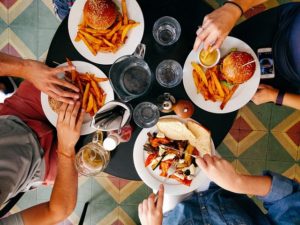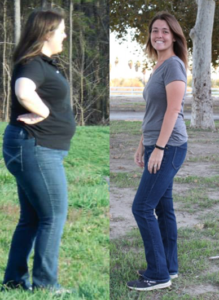Here is what I believe about food, eating, fasting, and exercise, based on my own 80-pound weight loss journey.
Diets are a bad idea.
Eating is one of the most basic functions of life. Every animal in the animal kingdom knows how much, and what, to eat.
We humans have the same ability. The problem is that we have been told by the powers that be (government, online “influencers”, and the diet and weight loss industry) that we do not. And we have believed them.
Anyone can lose weight eating whatever they want, provided they do not eat too much.
- Ben Sisarsky lost 8 pounds by eating a pint of Ben and Jerry’s every day for a month.
- John Cisna lost 60 pounds eating McDonald’s 3 times a day.
- Mark Haub lost 27 pounds on the Twinkie diet and his health markers improved.
Eating is not merely about consuming calories.
Gathering around a table with our family and friends to share a meal is a sacred act. It’s fun to go get Slush Puppies on a hot summer day with the kids. A warm plate of chocolate chip cookies comforts our souls when we have suffered the loss of a loved one. Ignoring the social, cultural, and emotional aspects of food is asking for trouble.

Carbs are not the enemy. Overconsumption of food and ingratitude are our real problems.
People have been eating bread and pie since the beginning of time. Equating sugar to poison is ridiculous. The only thing that is unhealthy about any food is any unhealthy attitude we bring to it. Turning nutrition into our religion is a terrible idea.
Being ungrateful for, scared of, or anxious about food is a waste of time. Barring a severe allergy or medical condition, fretting over a slice of cake, a piece of pizza, or a glass of wine does far more harm than any excess calories or sugar you may be consuming.
Fasting is useful for weight loss.
Fasting helps us lose weight because it helps us learn to eat the right amount. However, if we fast and then overeat, we will gain weight.
Fasting helps us become self-disciplined. We learn how to tell ourselves no. And when we can ourselves no, we can tell others no. This is empowering and gives us freedom.
Eating mindfully is important.
This means being present mentally. We should turn off our phones, our televisions, put away our work, and focus on the task at hand: eating. We should take bites and chew them and do our best to savor the food. Scarfing food like a wolverine is bound to lead to weight gain, no matter what’s on our plates.
We can’t outrun our forks.
Ultimately, if we have a weight problem, the place to focus is how much we’re eating. High-intensity exercise is great, but it also increases the appetite. If we only focus on moving more, we’re setting ourselves up for frustration.
Being sedentary is bad for our mental health.
Weight loss is a mental game above all, and keeping our head in the right space is important. The type of activity does not matter. Walk, run, jog, lift weights, play tennis, or do some gardening. The main thing is that we get up and off the couch.
Ideally, we venture outside a little each day, to remind ourselves that the real world is a better than the fake one social media would have us be a prisoner in.
Weight loss is simple.
We lose weight when we eat less than what our body burns. Weight gain happens when we eat too much food. Doubting the laws of science and thermodynamics will lead to plateaus and frustration.
Daily weighing is a healthy habit when done with the right attitude.
Habits are easier to stick with when done every day. This is not about obsessing over a number. Weighing is about holding ourselves accountable so that weight regain doesn’t sneak up on us.
The number on the scale is not the most important thing.
Ultimately, the goal is to get ourselves to a place where we are comfortable in our own skin. When our weight is not hampering our physical health, that is sufficient. Chasing a lower number for the sake of weighing less is a waste of time. Weight loss has a point of diminishing returns, and it’s important to stop once we’ve found it for ourselves.
Obesity is not a disease.
Obesity results from personal daily choices, namely habitual overeating. The now popular notion that obesity is a predestined mysterious condition that a person is helpless to fight against is a load of manure. It’s an attempt to convince 41% of the population that they’re weak victims who can’t control themselves.
Formerly obese people prove that obesity is not a disease. It’s both something you can prevent and something you can fix. These days, it is necessary to state the obvious. Every formerly obese person learned how to eat less food and thus lost weight.
Weight regain is not inevitable.
The notion that weight loss is pointless because weight regain is inevitable is another popular myth that needs to die. Weight loss maintenance is not mysterious. If we stay in the habits that helped us lose weight, we will keep the weight off. But if we ever go back to eating how we used to eat, we will regain the weight.

Weight loss is empowering.
Successful weight loss, when done with the proper mindset, is empowering. We gain:
- Self-discipline
- Confidence
- Zest for life.
- Independence
- Freedom.
Our ability to get into better habits usually spreads to and improves other areas of our life. Our finances, relationships, spiritual health, mental health, and career usually improve as the scale moves down.
